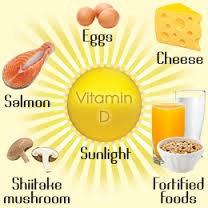Are you getting enough Vitamin D?
Published on April 20, 2017
 Fast Facts About Vitamin D3:
Fast Facts About Vitamin D3:
- Though we obtain some of our vitamin D from dietary sources (most often fortified foods), most is made in our bodies through sun exposure.
- In Canada, a lack of direct sunlight in winter means we don’t typically get enough exposure to make adequate vitamin D from October to April.
- Approximately 1/3 of Canadians have vitamin D levels above 75 nmol/L, the minimum level optimal for health. Meaning that 2/3’s of us are deficient! (http://www.statcan.gc.ca/pub/82-003-x/2010001/article/11131/findings-resultats-eng.htm)
- A 2010 study estimated that 37,000 deaths could be prevented every year if the Canadian average vitamin D level was 105 nmol/L. (http://www.ncbi.nlm.nih.gov/pubmed/20352622)
Risks for Low Levels of Vitamin D:
- SPF 15 sunscreen reduces D synthesis by 99%.
- Dark skin – melanin can reduce vitamin D synthesis by up to 99%
- Age – synthesis decreases by about 75% in a 70 year old
- Low body fat levels – vitamin D is fat soluble
- Specific medications can speed up breakdown of vitamin D
- Cholesterol-lowering medications – having too-low cholesterol impairs the body’s ability to make vitamin D.
Did You Know?
- Certain health conditions are associated with dramatically reduced stores of vitamin D3 and show benefit from significant supplementation.
- Low levels of vitamin D may be linked to other diseases, including breast and colon cancer, prostate cancer, high blood pressure, depression, and obesity (http://umm.edu/health/medical/altmed/supplement/vitamin-d#ixzz3HS1jRS7X )
- OHIP will only cover the cost of vitamin D testing for patients with: Osteoporosis, Osteopenia, Malabsorption Syndromes, Renal Disease, Patients on medications that affect vitamin D metabolism
-
The blood test for Vitamin D3 costs ~$35 – speak to your MD or Naturopathic Doctor today to request testing!
 Fast Facts About Vitamin D3:
Fast Facts About Vitamin D3: Request Appointment
Request Appointment Email Us
Email Us
